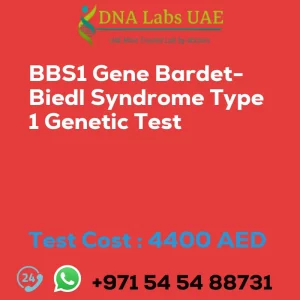Nephrology Panel NGS Genetic Test
About the Test
The Nephrology Panel NGS Genetic DNA Test offered by DNA Labs UAE is a comprehensive genetic test that analyzes a patient’s DNA to identify mutations or variations in genes associated with kidney diseases.
Test Components and Price
Test Name: Nephrology Panel NGS Genetic DNA Test
Components: Various genes associated with kidney diseases
Price: 4400.0 AED
Sample Condition
Blood or Extracted DNA or One drop Blood on FTA Card
Report Delivery
3 to 4 Weeks
Testing Method
Next-Generation Sequencing (NGS) Technology
Test Type
Hepatology Nephrology Endocrinology Disorders
Doctor
General Physician
Test Department
Genetics
Pre-Test Information
Before undergoing the Nephrology Panel NGS Genetic DNA Test, it is important to provide the clinical history of the patient. Additionally, a genetic counseling session may be conducted to draw a pedigree chart of family members affected with various genes associated with kidney diseases, including ABCB11, ABCB4, ABCC2, ACTN4, ACVR2B, AGPS, AHI1, AIPL1, AKR1D1, ALDOB, ALG8, ALPL, ANKH, ANKS6, ANO5, ANOS1, AP2S1, ARHGAP31, ARHGDIA, ARL13B, ARL6, ARMC4, ARSL, ATP6V0A4, ATP6V1B1, ATP8B1, ATR, B9D1, B9D2, BBS1, BBS10, BBS12, BBS2, BBS4, BBS5, BBS7, BBS9, BCS1L, BICC1, BMP1, BMPR1B, BSND, C8orf37, CA2, CABP4, CANT1, CASP10, CASR, CC2D2A, CCDC103, CCDC114, CCDC151, CCDC28B, CCDC39, CCDC40, CCDC65, CCNO, CD2AP, CDKN1C, CENPF, CENPJ, CEP152, CEP164, CEP290, CEP41, CEP63, CFAP298, CFAP53, CFC1, CFTR, CHD7, CHSY1, CILK1, CLCN5, CLCNKA, CLCNKB, CLDN16, CLDN19, CNGA3, COL10A1, COL4A1, COL4A3, COL4A4, COL4A5, COL9A3, COMP, COQ2, COQ6, COQ8B, COQ9, CPLANE1, CRB1, CRELD1, CRTAP, CRX, CSPP1, CTNS, CUBN, CUL3, CYP7B1, DDR2, DGKE, DGUOK, DHCR7, DMP1, DNAAF1, DNAAF2, DNAAF3, DNAAF4, DNAAF5, DNAH11, DNAH5, DNAI1, DNAI2, DNAL1, DRC1, DUSP6, DYM, DYNC2H1, EBP, EIF2AK3, ENPP1, ESCO2, EVC, EVC2, FAH, FAS, FASLG, FEZF1, FGF17, FGF23, FGF8, FGFR1, FKBP10, FLNB, FLRT3, FSHB, FXYD2, GDF1, GDF5, GFM1, GHR, GLA, GLI2, GLI3, GLIS2, GNA11, GNAS, GNPAT, GNRH1, GNRHR, GUCY2D, HAMP, HESX1, HEXA, HFE, HNF1B, HNF4A, HS6ST1, HSD11B2, HSD3B7, HSPG2, HYDIN, HYLS1, IFITM5, IFT122, IFT140, IFT172, IFT27, IFT43, IFT80, IL17RD, IMPDH1, INF2, INPP5E, INPPL1, INVS, IQCB1, ITGA3, JAG1, KCNJ1, KCNJ10, KCNJ13, KCNJ5, KIF7, KISS1, KISS1R, KLHL3, LAMB2, LBR, LCA5, LCT, LEFTY2, LEP, LEPR, LHB, LHX3, LHX4, LIFR, LMX1B, LRAT, LRP5, LRRC6, LZTFL1, MAGI2, MATN3, MCEE, MERTK, MKKS, MKS1, MMAA, MMAB, MMADHC, MMP13, MMP21, MMP9, MMUT, MPV17, MYH9, MYO7A, NBAS, NEK1, NEK8, NEUROG3, NKX2-5, NKX3-2, NME8, NMNAT1, NODAL, NOG, NOTCH2, NPC1, NPC2, NPHP1, NPHP3, NPHP4, NPHS1, NPHS2, NR0B1, NR0B2, NR3C2, NSDHL, NSMF, OCRL, OFD1, OTX2, P3H1, PAX2, PCSK1, PDE6D, PDSS2, PEX1, PEX10, PEX12, PEX2, PEX26, PEX5, PEX6, PEX7, PHEX, PHF6, PKD1, PKD1L1, PKD2, PKHD1, PLCE1, PLOD2, PMM2, PNPLA6, POLG, POLR3B, POMC, POU1F1, PPARG, PPIB, PRKAR1A, PROK2, PROKR2, PROM1, PROP1, PRPH2, PTH1R, RBBP8, RD3, RDH12, RDH5, RHO, RLBP1, RMND1, ROR2, RPE65, RPGRIP1, RPGRIP1L, RRM2B, RSPH1, RSPH4A, RSPH9, RUNX2, SALL1, SALL4, SBDS, SCARB2, SCNN1A, SCNN1B, SCNN1G, SDCCAG8, SEMA3A, SERPINA1, SERPINF1, SERPINH1, SLC12A1, SLC12A3, SLC25A13, SLC25A15, SLC26A2, SLC26A3, SLC2A2, SLC34A1, SLC34A3, SLC35D1, SLC4A1, SLC4A4, SLCO1B1, SLCO1B3, SMPD1, SOX10, SOX2, SOX3, SOX9, SPAG1, SPATA7, SPINT2, SPRY4, TAC3, TACR3, TBX5, TCTN1, TCTN2, TCTN3, TFR2, TJP2, TMEM138, TMEM216, TMEM231, TMEM237, TMEM67, TNFRSF11B, TRIM32, TRIP11, TRMU, TRPC6, TRPS1, TRPV4, TSC1, TSC2, TTC21B, TTC8, TULP1, UGT1A1, VHL, VIPAS39, WDPCP, WDR11, WDR19, WDR34, WDR35, WDR60, WDR73, WNK1, WNK4, WNT5A, WNT7A, WT1, ZIC3, ZMYND10, ZNF423
Test Details
The Nephrology Panel NGS Genetic DNA Test is a powerful tool for diagnosing and managing kidney diseases. It utilizes next-generation sequencing (NGS) technology to analyze multiple genes associated with kidney diseases in a single test.
This test is primarily used to:
- Diagnose inherited kidney diseases, such as polycystic kidney disease, Alport syndrome, and Fabry disease.
- Identify genetic factors that increase the risk of developing kidney disease, including mutations in the APOL1 gene.
The results of the Nephrology Panel NGS Genetic DNA Test can provide valuable information for treatment decisions, prognosis, and identifying family members who may be at risk of developing kidney disease.
By offering a comprehensive analysis of a patient’s genetic profile, this test has the potential to improve patient outcomes and quality of life.
| Test Name | Nephrology Pnael NGS Genetic DNA Test |
|---|---|
| Components | |
| Price | 4400.0 AED |
| Sample Condition | Blood or Extracted DNA or One drop Blood on FTA Card |
| Report Delivery | 3 to 4 Weeks |
| Method | NGS Technology |
| Test type | Hepatology Nephrology Endocrinology Disorders |
| Doctor | General Physician |
| Test Department: | Genetics |
| Pre Test Information | Clinical History of Patient who is going for Nephrology Pnael NGS Genetic DNA Test. A Genetic Counselling session to draw a pedigree chart of family members affected with ABCB11, ABCB4, ABCC2, ACTN4, ACVR2B, AGPS, AHI1, AIPL1, AKR1D1, ALDOB, ALG8, ALPL, ANKH, ANKS6, ANO5, ANOS1, AP2S1, ARHGAP31, ARHGDIA, ARL13B, ARL6, ARMC4, ARSL, ATP6V0A4, ATP6V1B1, ATP8B1, ATR, B9D1, B9D2, BBS1, BBS10, BBS12, BBS2, BBS4, BBS5, BBS7, BBS9, BCS1L, BICC1, BMP1, BMPR1B, BSND, C8orf37, CA2, CABP4, CANT1, CASP10, CASR, CC2D2A, CCDC103, CCDC114, CCDC151, CCDC28B, CCDC39, CCDC40, CCDC65, CCNO, CD2AP, CDKN1C, CENPF, CENPJ, CEP152, CEP164, CEP290, CEP41, CEP63, CFAP298, CFAP53, CFC1, CFTR, CHD7, CHSY1, CILK1, CLCN5, CLCNKA, CLCNKB, CLDN16, CLDN19, CNGA3, COL10A1, COL4A1, COL4A3, COL4A4, COL4A5, COL9A3, COMP, COQ2, COQ6, COQ8B, COQ9, CPLANE1, CRB1, CRELD1, CRTAP, CRX, CSPP1, CTNS, CUBN, CUL3, CYP7B1, DDR2, DGKE, DGUOK, DHCR7, DMP1, DNAAF1, DNAAF2, DNAAF3, DNAAF4, DNAAF5, DNAH11, DNAH5, DNAI1, DNAI2, DNAL1, DRC1, DUSP6, DYM, DYNC2H1, EBP, EIF2AK3, ENPP1, ESCO2, EVC, EVC2, FAH, FAS, FASLG, FEZF1, FGF17, FGF23, FGF8, FGFR1, FKBP10, FLNB, FLRT3, FSHB, FXYD2, GDF1, GDF5, GFM1, GHR, GLA, GLI2, GLI3, GLIS2, GNA11, GNAS, GNPAT, GNRH1, GNRHR, GUCY2D, HAMP, HESX1, HEXA, HFE, HNF1B, HNF4A, HS6ST1, HSD11B2, HSD3B7, HSPG2, HYDIN, HYLS1, IFITM5, IFT122, IFT140, IFT172, IFT27, IFT43, IFT80, IL17RD, IMPDH1, INF2, INPP5E, INPPL1, INVS, IQCB1, ITGA3, JAG1, KCNJ1, KCNJ10, KCNJ13, KCNJ5, KIF7, KISS1, KISS1R, KLHL3, LAMB2, LBR, LCA5, LCT, LEFTY2, LEP, LEPR, LHB, LHX3, LHX4, LIFR, LMX1B, LRAT, LRP5, LRRC6, LZTFL1, MAGI2, MATN3, MCEE, MERTK, MKKS, MKS1, MMAA, MMAB, MMADHC, MMP13, MMP21, MMP9, MMUT, MPV17, MYH9, MYO7A, NBAS, NEK1, NEK8, NEUROG3, NKX2-5, NKX3-2, NME8, NMNAT1, NODAL, NOG, NOTCH2, NPC1, NPC2, NPHP1, NPHP3, NPHP4, NPHS1, NPHS2, NR0B1, NR0B2, NR3C2, NSDHL, NSMF, OCRL, OFD1, OTX2, P3H1, PAX2, PCSK1, PDE6D, PDSS2, PEX1, PEX10, PEX12, PEX2, PEX26, PEX5, PEX6, PEX7, PHEX, PHF6, PKD1, PKD1L1, PKD2, PKHD1, PLCE1, PLOD2, PMM2, PNPLA6, POLG, POLR3B, POMC, POU1F1, PPARG, PPIB, PRKAR1A, PROK2, PROKR2, PROM1, PROP1, PRPH2, PTH1R, RBBP8, RD3, RDH12, RDH5, RHO, RLBP1, RMND1, ROR2, RPE65, RPGRIP1, RPGRIP1L, RRM2B, RSPH1, RSPH4A, RSPH9, RUNX2, SALL1, SALL4, SBDS, SCARB2, SCNN1A, SCNN1B, SCNN1G, SDCCAG8, SEMA3A, SERPINA1, SERPINF1, SERPINH1, SLC12A1, SLC12A3, SLC25A13, SLC25A15, SLC26A2, SLC26A3, SLC2A2, SLC34A1, SLC34A3, SLC35D1, SLC4A1, SLC4A4, SLCO1B1, SLCO1B3, SMPD1, SOX10, SOX2, SOX3, SOX9, SPAG1, SPATA7, SPINT2, SPRY4, TAC3, TACR3, TBX5, TCTN1, TCTN2, TCTN3, TFR2, TJP2, TMEM138, TMEM216, TMEM231, TMEM237, TMEM67, TNFRSF11B, TRIM32, TRIP11, TRMU, TRPC6, TRPS1, TRPV4, TSC1, TSC2, TTC21B, TTC8, TULP1, UGT1A1, VHL, VIPAS39, WDPCP, WDR11, WDR19, WDR34, WDR35, WDR60, WDR73, WNK1, WNK4, WNT5A, WNT7A, WT1, ZIC3, ZMYND10, ZNF423 |
| Test Details |
Nephrology panel NGS genetic DNA test is a genetic test that analyzes a patient’s DNA to identify mutations or variations in genes that are associated with kidney diseases. This test uses next-generation sequencing (NGS) technology to sequence multiple genes at once, providing a comprehensive analysis of the patient’s genetic profile. The test is used to diagnose inherited kidney diseases, such as polycystic kidney disease, Alport syndrome, and Fabry disease. It can also help identify genetic factors that increase the risk of developing kidney disease, such as mutations in the APOL1 gene. The results of the nephrology panel NGS genetic DNA test can help guide treatment decisions and provide information about the patient’s prognosis. It can also be used to identify family members who may be at risk of developing kidney disease. Overall, the nephrology panel NGS genetic DNA test is a powerful tool for diagnosing and managing kidney diseases, and it has the potential to improve patient outcomes and quality of life. |







